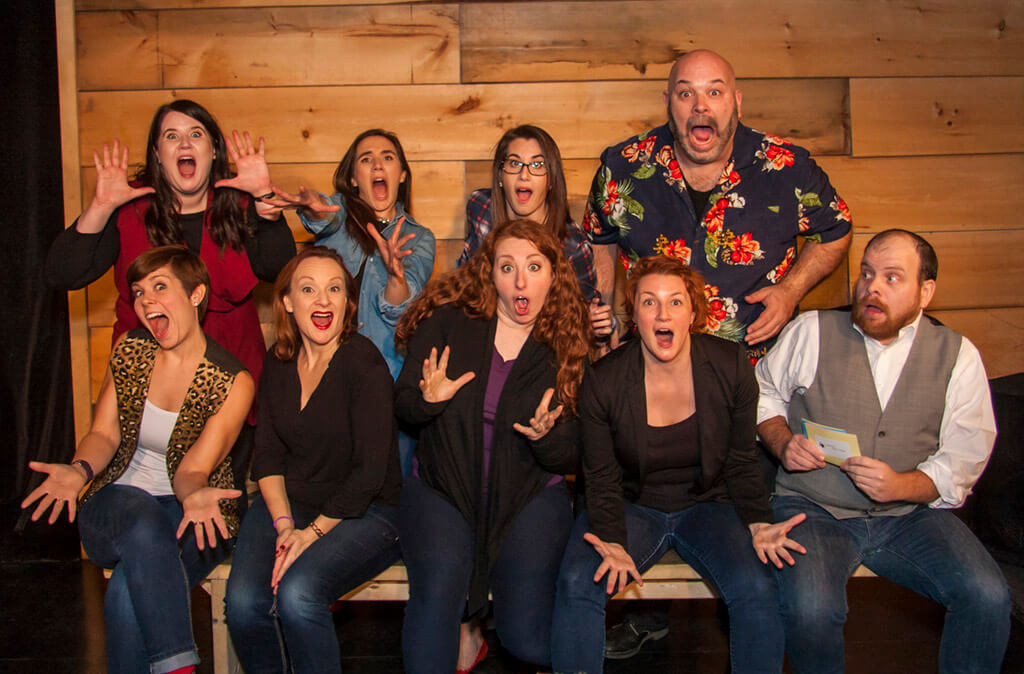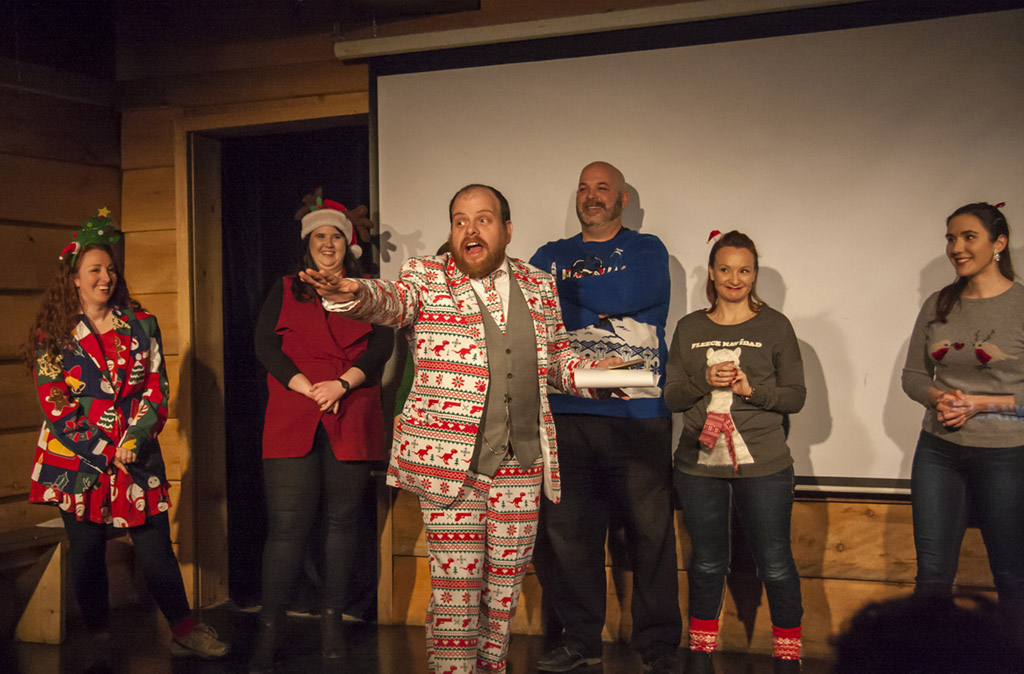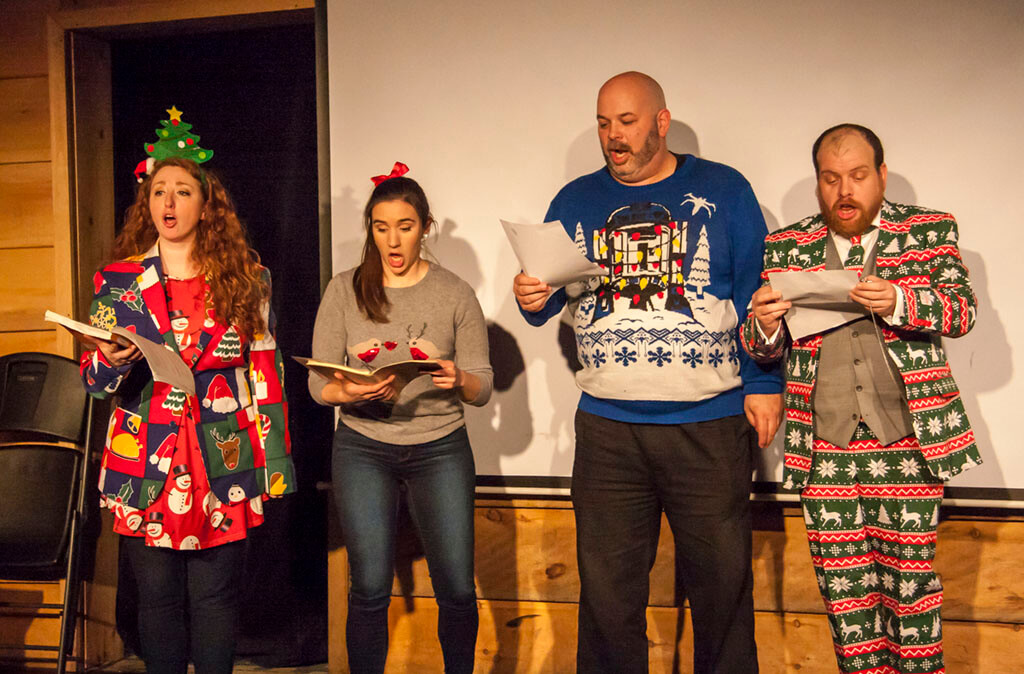
For many comedy lovers, it was a tragic day in 2007 when the improv comedy show “Whose line is it anyway” was cancelled. It left many people wondering, whether anything could fill the void it left behind. Although nothing ever could, for those of you who love opera and thought at times that “Whose line is it anyway” could benefit from its melodrama and eccentricity, you will be happy to know that “Whose opera is it anyway?” by Loose Tea Music Theatre increases these qualities two-fold. Performed at the Bad Dog Theatre December 20, this Christmas themed show combined opera with comedy and improv with maybe one too many ugly Christmas sweaters (although the Fleece Navidad sweater with an Alpaca in a scarf was #genius).
Not so Different from Traditional Opera After all
When LooseTeaOpera invited me via Twitter to their show, my first thought was that it would be a disaster. I couldn’t help but ask myself, “how can you compose opera, the music and the text, on the spot?” and more importantly, “would it be funny?”
Historically speaking, both improvisation and comedy have a long history in opera. In the 18th and 19th centuries, singers uniquely ornamented their vocal lines and designed their own florid cadenza at the end of their arias (there is evidence to support that sometimes these were planned, but at other times they were improvised). Although one of the many stereotypes about opera is that it is sad, in the 18th and 19th centuries there were more comedies and happy endings than tragic operas. In some ways, “Whose opera is it anyway” revives a rich and fertile operatic history. However, until the other night, I had never heard of an entirely improvised opera.
“Whose Line is it anyway?” with an Operatic Twist
Like the original show, “Whose OPERA is it anyway” has a host, Gregory Finney, who explained each game, picked the participants, cracked jokes, and asked the audience to suggest themes for the performers to improvise on. To avoid confusion, this was all spoken. It was only when playing the games that the performers sang, however, to set up some of the jokes explored in their improvised arias the performers would often speak. This too has a lineage in opera as seen in genres including German Singspiel (ex. Mozart’s Die Zauberflöte) and French opéra-comique (ex. Bizet’s Carmen).
Most of the games were reminiscent of the show with an operatic twist. For example, the night began with “One-minute opera.” Here, the audience suggested ideas for opera plots, such as Amazon customer service, the television drama “This is us,” and the gift that keeps on giving: a dildo for Christmas, and the performers had a minute to bring them to life.

Operatic Stereotypes Make for Great Laughs
What I did not expect was that many of opera’s stereotypes made great gags. Ironically, the aspects of opera that make it the most impressive and serious, such as high notes, death, and love, were reinterpreted hilariously by the cast. There were games that poked fun at each of these stereotypes from love scenes to laments. However, one of the most creative games was new to me. Using one of the audience’s Instagram accounts, the performers would sing to describe the photos chosen by the audience. The audience, and the person who shared their Instagram, seemed to laugh nonstop.
There were No Winners, but there were Favourites
Unlike “Whose line” this show had no winner (not that anyone cared who won the original show), but there were obvious favourites. Although there were many great performances, by a show of cheers and laughter the Ryan Stiles and Colin Mochrie of the night were Amanda Cogan and Gillian Grossman. The highlight for me was their performance of a rollercoaster date where Cogan was in love with Grossman’s character, but Grossman was secretly plotting to throw Cogan off the ride.
Since it was improvised most of the singing by all the performers at its most basic was like a church psalm. The amazingly talented Natasha Fransblow (I cannot over-emphasize how amazing) would play a predictable chord progression at the piano decorated by an intriguing musical theme, above which the singers had creative freedom to create the melody and the text (which is by no means a small feat). However, in Cogan and Grossman’s duet to emphasize the approaching climax, Fransblow improvised some challenging modulations that Cogan quickly adapted too, and on top of this both Cogan and Grossman improvised some lovely phrase shaping. When talking about being in the air Grossman sang a melisma to imitate it, and when going down the ride, Cogan literally sang large downward leaps to signify the drop. Not only was this one of the funniest skits of the night, but it was also the most musically collaborative and original. Moments like this make the show well worth attending!
The other performers included Rachel Kremm, Erin Stone, Adanya Dunn, and Michael York, who all gave very committed and animated performances. I also must applaud Andy Hull’s collaboration with the performers to time the lights and music after each scene had played out for a smooth transition between them.
Throughout this review, you might have noticed that I don’t provide the performers’ voice types. This is in part because their voices were more a vehicle for the humour as opposed to the focus of the performance like in an opera. It would be unfair to judge these performers’ singing by the same standards. Also, since the range and colour of each performers’ voices were pushed to their extremities for comic affect (including an array of high notes and even extreme low notes, or a helium balloon voice to a growling polar bear voice), the singers defied the categorization of voice types like mezzo-soprano vs. soprano. As in opera of the 18th and early 19th centuries, where these voice categorizations did not exist, the music was instead tailored to an individual performer’s voice. In some ways, like in this show, the performer and composer became one.

What are we Laughing at?
By the end of the show, however, two pieces recalled to my mind––and perhaps those of the audience––the fact that classical music and opera itself have immense difficulty whenever they try to shake its reputation for gravitas and self-importance. Near the end of the show, the quartet of Finney, York, Dunn, and Kremm performed a somewhat improvised version of Handel’s Messiah in just five minutes. A compressed and frantic version should be comical yet, it turned out to be the least effective part of the show. Amidst some truly innovative improvisations, the Messiah sketch rested heavily on the music itself, and I found that I did not know how to respond — should I listen question the artistry, or should I laugh at its subversion? Similarly, when Dunn sang the famous “Quando m’en vo” from La Bohème in its proper style, before re-interpreting it with comical sounds, I was drawn in by the artistry, but was jarred when it was altered to make me laugh. To mock an aria almost seemed to re-impose the fact that opera is stereotypically seen as silly, and this is ironic given that the performance was meant to broaden opera’s appeal by making it less intimidating. I’m by no means saying that opera shouldn’t make fun of itself or even be made fun of for that matter. What I’m trying to expose is the gap we now perceive between opera as a serious and antiquated art form as opposed to popular entertainment. In the same way that the use of pop music between sets in “Whose opera is it anyway” seemed to confirm the lack of place for opera beyond the stage, we must ask ourselves: are we laughing with opera, or only at it?
To find your own answer to this question, check out Loose Tea Music Theatre’s “Whose Opera is it Anyway” in the New Year at there permanent time slot at 9:30 pm in Bad Dog Comedy Theatre at Bloor and Ossington.
#LUDWIGVAN
Want more updates on Toronto-centric classical music news and reviews before anyone else finds out? Follow us on Facebook or Twitter for all the latest.
![]()



